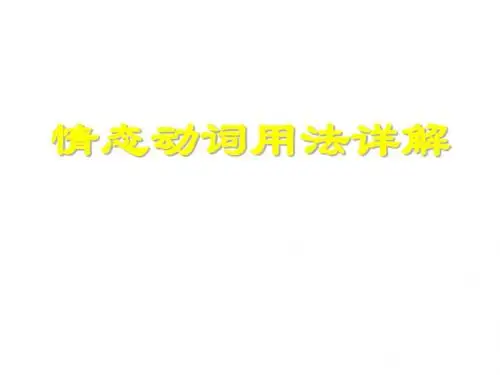情态动词用法详解共45页文档
- 格式:ppt
- 大小:299.50 KB
- 文档页数:45
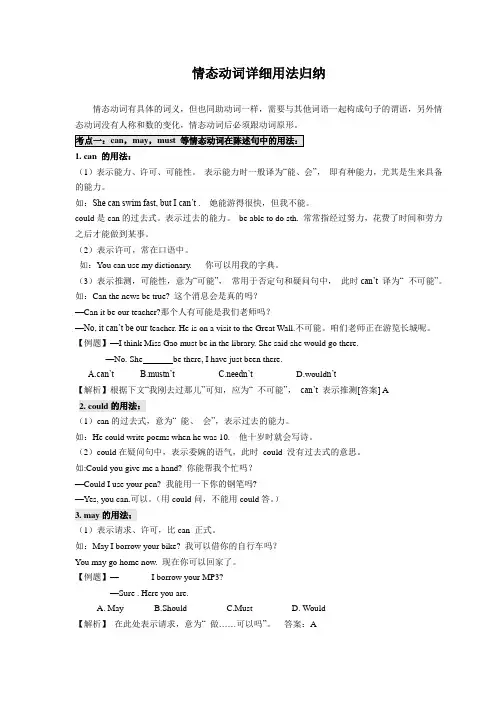
情态动词详细用法归纳情态动词有具体的词义,但也同助动词一样,需要与其他词语一起构成句子的谓语,另外情态动词没有人称和数的变化,情态动词后必须跟动词原形。
1. can 的用法:(1)表示能力、许可、可能性。
表示能力时一般译为“能、会”,即有种能力,尤其是生来具备的能力。
如:She can swim fast, but I can’t . 她能游得很快,但我不能。
could是can的过去式。
表示过去的能力。
be able to do sth. 常常指经过努力,花费了时间和劳力之后才能做到某事。
(2)表示许可,常在口语中。
如:You can use my dictionary. 你可以用我的字典。
(3)表示推测,可能性,意为“可能”,常用于否定句和疑问句中,此时can’t 译为“ 不可能”。
如:Can the news be true? 这个消息会是真的吗?—Can it be our teacher?那个人有可能是我们老师吗?—No, it can’t be our t eacher. He is on a visit to the Great Wall.不可能。
咱们老师正在游览长城呢。
【例题】—I think Miss Gao must be in the library. She said she would go there.—No. She be there, I have just been there.A.can’tB.mustn’tC.needn’tD.would n’t【解析】根据下文“我刚去过那儿”可知,应为“ 不可能”,can’t 表示推测[答案] A2. could的用法:(1)can的过去式,意为“ 能、会”,表示过去的能力。
如:He could write poems when he was 10. 他十岁时就会写诗。
(2)could在疑问句中,表示委婉的语气,此时could 没有过去式的意思。
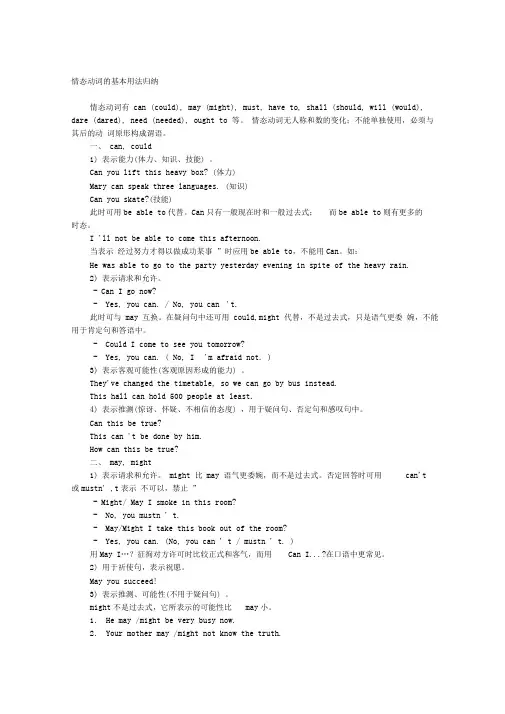
情态动词的基本用法归纳情态动词有can (could), may (might), must, have to, shall (should, will (would), dare (dared), need (needed), ought to 等。
情态动词无人称和数的变化;不能单独使用,必须与其后的动词原形构成谓语。
一、can, could1)表示能力(体力、知识、技能) 。
Can you lift this heavy box? (体力)Mary can speak three languages. (知识)Can you skate?(技能)此时可用be able to代替。
Can只有一般现在时和一般过去式;而be able to则有更多的时态。
I 'll not be able to come this afternoon.当表示经过努力才得以做成功某事”时应用be able to,不能用Can。
如:He was able to go to the party yesterday evening in spite of the heavy rain.2)表示请求和允许。
- Can I go now?- Yes, you can. / No, you can 't.此时可与may 互换。
在疑问句中还可用could,might 代替,不是过去式,只是语气更委婉,不能用于肯定句和答语中。
- Could I come to see you tomorrow?- Yes, you can. ( No, I 'm afraid not. )3)表示客观可能性(客观原因形成的能力) 。
They've changed the timetable, so we can go by bus instead.This hall can hold 500 people at least.4)表示推测(惊讶、怀疑、不相信的态度) ,用于疑问句、否定句和感叹句中。

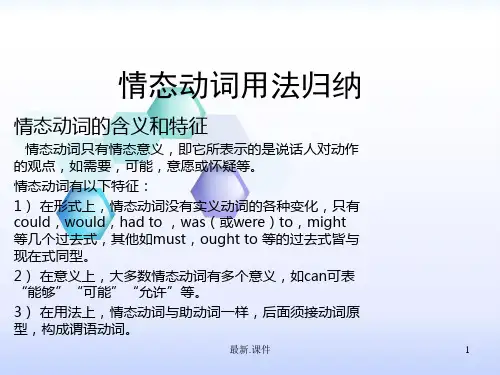
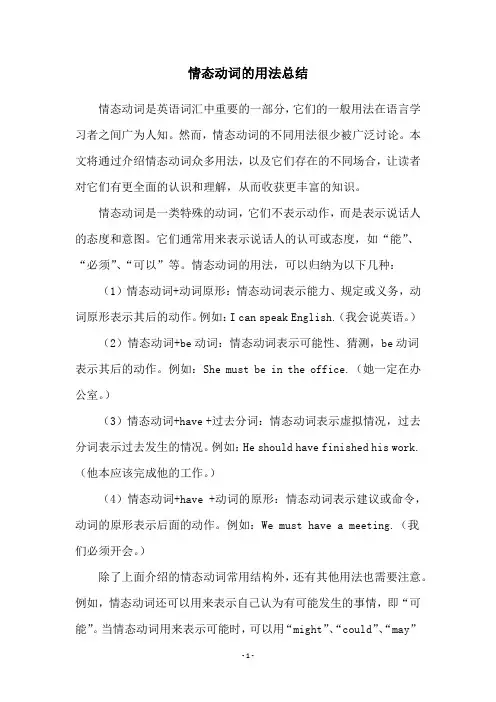
情态动词的用法总结情态动词是英语词汇中重要的一部分,它们的一般用法在语言学习者之间广为人知。
然而,情态动词的不同用法很少被广泛讨论。
本文将通过介绍情态动词众多用法,以及它们存在的不同场合,让读者对它们有更全面的认识和理解,从而收获更丰富的知识。
情态动词是一类特殊的动词,它们不表示动作,而是表示说话人的态度和意图。
它们通常用来表示说话人的认可或态度,如“能”、“必须”、“可以”等。
情态动词的用法,可以归纳为以下几种:(1)情态动词+动词原形:情态动词表示能力、规定或义务,动词原形表示其后的动作。
例如:I can speak English.(我会说英语。
)(2)情态动词+be动词:情态动词表示可能性、猜测,be动词表示其后的动作。
例如:She must be in the office.(她一定在办公室。
)(3)情态动词+have +过去分词:情态动词表示虚拟情况,过去分词表示过去发生的情况。
例如:He should have finished his work.(他本应该完成他的工作。
)(4)情态动词+have +动词的原形:情态动词表示建议或命令,动词的原形表示后面的动作。
例如:We must have a meeting.(我们必须开会。
)除了上面介绍的情态动词常用结构外,还有其他用法也需要注意。
例如,情态动词还可以用来表示自己认为有可能发生的事情,即“可能”。
当情态动词用来表示可能时,可以用“might”、“could”、“may”等表达。
例如:He might be able to help us.(他可能可以帮助我们。
)此外还可以使用“should”表示建议,它的否定形式“should not”可以表示禁止或劝阻。
例如:You should not go out after dark.(你晚上不应该出去。
)情态动词还可以用来表示让步,这时使用的情态动词一般是“could”或“would”。
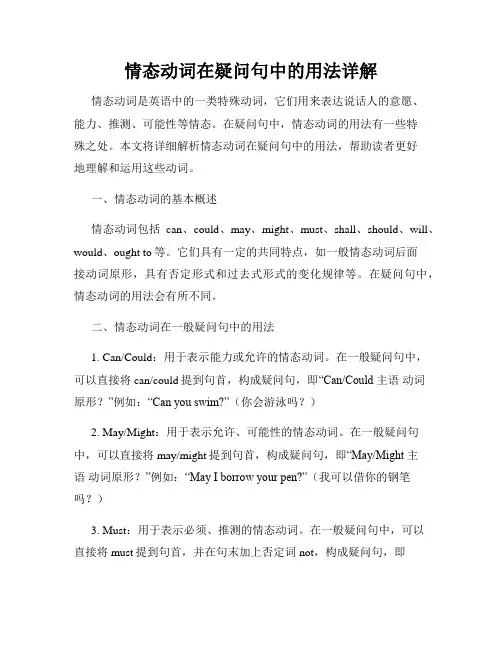
情态动词在疑问句中的用法详解情态动词是英语中的一类特殊动词,它们用来表达说话人的意愿、能力、推测、可能性等情态。
在疑问句中,情态动词的用法有一些特殊之处。
本文将详细解析情态动词在疑问句中的用法,帮助读者更好地理解和运用这些动词。
一、情态动词的基本概述情态动词包括can、could、may、might、must、shall、should、will、would、ought to等。
它们具有一定的共同特点,如一般情态动词后面接动词原形,具有否定形式和过去式形式的变化规律等。
在疑问句中,情态动词的用法会有所不同。
二、情态动词在一般疑问句中的用法1. Can/Could:用于表示能力或允许的情态动词。
在一般疑问句中,可以直接将can/could提到句首,构成疑问句,即“Can/Could 主语动词原形?”例如:“Can you swim?”(你会游泳吗?)2. May/Might:用于表示允许、可能性的情态动词。
在一般疑问句中,可以直接将may/might提到句首,构成疑问句,即“May/Might 主语动词原形?”例如:“May I borrow your pen?”(我可以借你的钢笔吗?)3. Must:用于表示必须、推测的情态动词。
在一般疑问句中,可以直接将must提到句首,并在句末加上否定词not,构成疑问句,即“Must 主语动词原形?”例如:“Must I finish the project today?”(我必须今天完成这个项目吗?)4. Shall/Should:用于表示建议、意图的情态动词。
在一般疑问句中,可以直接将shall/should提到句首,构成疑问句,即“Shall/Should 主语动词原形?”例如:“Shall we go to the park tomorrow?”(明天我们去公园好吗?)5. Will/Would:用于表示意愿、请求的情态动词。
在一般疑问句中,可以直接将will/would提到句首,构成疑问句,即“Will/Would 主语动词原形?”例如:“Will you help me with my homework?”(你能帮我做作业吗?)6. Ought to:用于表示应该、责任的情态动词。
